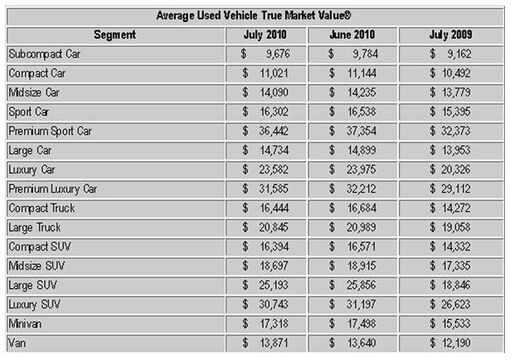Used Car Prices Rise, But Is Cash For Clunkers To Blame?
Edmunds is tracking an $1,800 average increase in the price of used cars, as new-car sales have faltered with the shaky economy. But the increase in prices isn’t solely due to Americans tightening their belts and buying used instead of new. The biggest price increases by nameplate appear to be for large SUVs and vans like the Cadillac Escalade, Chevy Suburban, Dodge Grand Caravan, BMW X5 and Acura MDX. Edmunds senior analyst Joe Spina explains
So many economic factors affect automobile sales and prices. It’s believed that the program delayed purchases prior to the program and also pulled sales forward while in place. The program also eliminated inventory of older vehicles that were traded and then scrapped… Now, those who need trucks and large SUVs are buying them and in many cases are turning to used vehicles as a way to save money. Prices are high because this demand comes at a time when inventory is low as a result of the current shortage of lease returns and trade-ins for vehicles of this type.
Edmunds’ “Large SUV” segment shows prices up by nearly $7k per vehicle (over July 2009), compared to increases of less than $500 per vehicle for midsize and compact cars over the same period. Gas prices, meanwhile, are nearly unchanged from July of last year. Clearly something is affecting the price of used SUVs… if it’s not Cash-For-Clunkers, what is it?
More by Edward Niedermeyer

































Comments
Join the conversation
Those exorbitant executive salaries determined by the class of folks receiving them is an enormous financial burden so lets allow mega-millions of highly-educated motivated folks cross the border as we look the other way to bring those multi-million dollar salaries down to a more reasonable 50K$ per year with far fewer perks and no Golden Parachutes and good riddance to stock options. An equitable playing field from working-poor to the apex of the socio-economic pyramid. What could be wrong with that?
Last year you couldn't give used large SUVs away because "lifestyle" buyers where getting out of them as fast as they could thanks to the gasoline price shocks and fears that the price of fuel was only going further up. So, this year's recovery of the pricing of that class of vehicles is more about a regression to the mean than it is anything else. Er, sorry! I should have read all the comments first in which case I could have just said: +1 JP!
One question that has gone unanswered is how much Cash for Clunkers has benefited the rest of us by killing demand for gasoline. When you look at US gasoline production, as well as gasoline imports, it is terrifying low. VMT have picked up a bit from the lows, and that gap is where C4C might be assisting. I say might. because the big flaw for C4C was it didn't measure how much a vehicle was used. Clearly getting large SUVs out of suburban moms was a win -- but a large SUV sitting around and not being driven also doesn't use gasoline. The people I know who really benefited from C4C were redneck famers, who traded in their SUVs for driving for a sedan, and kept another SUV for practical use. Given that they are all avid Fox news views, I'm not sure why TTAC keeps bashing the program.
JJ99- When all you have is a hammer (or anti-union bias), everything begins to look like a nail (or union-caused problem). I'd consider adding a few new tools to the old analytical toolkit. Start by re-reading JPs economics-based post which fits the facts far better than a tired, over-used and largely fallacious argument about the UAW.